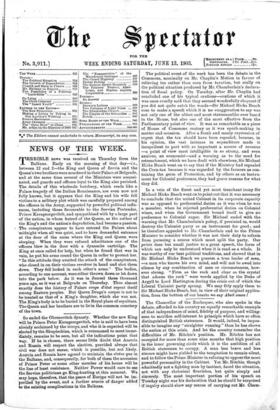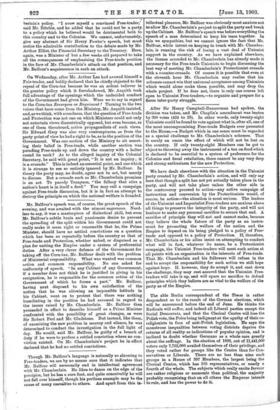The Chancellor of the Exchequer, who also spoke in the
debate, afforded to his country an equally remarkable example of that independence of mind, fidelity of purpose, and willing- ness to sacrifice self-interest to principle which have so often distinguished British statesmen. It would, indeed, be impos- sible to imagine any " straighter running " than he has shown the nation at this crisis. And let the country remember the difficulties of Mr. Ritchie's position. Mr. Ritchie has not occupied for more than some nine months that high position in the inner governing circle which it is the ambition of all British statesmen to occupy. A man less brave and less sincere might have yielded to the temptation to remain silent, and to follow the Prime Minister in refusing to oppose the most powerful personality in the Cabinet. Yet Mr. Ritchie, though admittedly not a fighting man by instinct, faced the situation, not with any rhetorical flourishes, but quite simply and sincerely. The most important portion of his speech on Tuesday night was his declaration that he should be Surprised if inquiry should show any means of carrying out Mr. Cham- berlain's policy. "I avow myself a convinced Free-trader,' said Mr. Ritchie, and he added that he could not be a party. to a policy which he believed would be detrimental both to this country and to the Colonies. We cannot, unfortunately, give any abstract of Sir Henry Fowler's speech, but must notice the admirable contribution to the debate made by Mr. Arthur Elliot, the Financial Secretary to the Treasury. Here, again, was a Minister of but a few weeks old prepared to take all the consequences of emphasising the Free-trade position in the face of Mr. Chamberlain's attack on that position, and Mr. Balfour's acquiescence in such an attack.











































 Previous page
Previous page